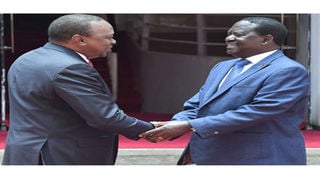
President Uhuru Kenyatta and opposition chief Raila Odinga at Harambee House on March 9, 2018.
| File | Nation Media GroupPolitics
Premium
For Uhuru Kenyatta and Raila Odinga, it is either their way or the highway
No one could have predicted with certainty that the sheer act of a handshake between two political rivals more than three years ago would re-draw the country’s political architecture. And like the former US president George Bush announced at the start of the military campaign against terrorism in 2001 following coordinated bombings in the US by Al-Qaeda: Either you are with us, or you are with the terrorists.
While Bush’s statement was a rallying call to foreign heads of states to join in the war against terror, the rapprochement between President Uhuru Kenyatta and ODM leader Raila Odinga has seen the drawing of a similar imaginary red line. You are either with them or with “those opposed to progress and common good of the republic, and must be dealt with as an enemy”.
And, because both the President and Mr Odinga are, in their own rights, veritable political heavyweights, none of those who have stood in their way has survived. Theirs is a classic example of what happens when two become one — only that in this case their political marriage is not taking any prisoners.
“The opposition was weakened when Raila crossed over to Uhuru’s side,” says Prof Amukowa Anangwe, a university lecturer and former Cabinet minister. “Almost all the critics took cover.”
Those who didn’t, says Prof Anangwe, opted to either toe the line, or bury their heads in sand. And nothing illustrates that better than Thursday’s voting patterns in the National Assembly on the Building Bridges Initiative Bill, where a number of MPs who were previously opposed to changes to the Constitution voted for them.
Rejection of the Bill
Among them were vocal Bahati MP Kimani Ngunjiri, Malava’s Malulu Injendi and his counterpart from Lunga Lunga Khatib Mwashetani, who had on numerous occasions professed rejection of the Bill. On the floor of the House, they found excuses in the political dynamics of their constituencies, like the promise of additional blocs or higher budgetary allocations.
During the vote, political parties supporting the Handshake kept a record of how members were voting. Insiders told the Sunday Nation that the plan was to ensure that those who went against the grain would not be cleared to run in the next elections. As is the tradition in parliamentary business, officials of Mr Kenyatta’s Jubilee Party and Mr Odinga’s ODM are expected to furnish the respective party organs with details of how each of their members voted.
While the vote is largely inconsequential, the duo still pushed for — and got — overwhelming support. Some say it was all for the sake of optics, others say it was a way of showing the opposition that Mr Kenyatta and Mr Odinga can marshal the numbers when required. In the end, they stamped their authority on the local political scene once more; this was not just a BBI vote, but also a major display of credibility as a loss would have denied them the steam to bring the public on board at the referendum.
In a statement on Wednesday, Mr Kenyatta and Mr Odinga attempted to build even more bridges, saying that “this is not the time for political adversity or personal aggrandisement, but the time to listen to the people and to remember that it is their sovereignty we exercise as their servants” .
For Mr Odinga and the President, their aim has been to have a non-contested referendum, but the isolation of Deputy President William Ruto, another centre of power away from the two, has created a muted but still powerful opposition to the push.
Betrayal
Driven by what they consider betrayal of DP Ruto by the President after embracing Mr Odinga, Tangatanga MPs are now moving to occupy the opposition slot. But, without a centrally coordinated approach, or the power of declared opposition, their grumbles are nothing but farts in the wind for the Handshake duo. The result? A messy, smelly display of power and authority that has consigned many to oblivion.
Former Senate Deputy Speaker and Tharaka Nithi Senator Kithure Kindiki was one of the initial casualties, followed by former Majority Leader Kipchumba Murkomen and Majority Whip Susan Kihika. The positions were taken up by Senators Margaret Kamar, Samuel Poghisio and Kimani Wamatangi. Before the appointment of Mr Wamatangi, Murang’a’s Irungu Kang’ata had a brief stint on the seat before he was kicked out on accusations of advancing Dr Ruto’s agenda in the House. In the National Assembly, Mr Benjamin Washiali (Majority Whip) suffered the same fate and was replaced by Navakholo’s Emmanuel Wangwe.
When Garissa Township MP Aden Duale was being stripped of his Majority Leader position in the National Assembly last year, Suna East MP and Minority Whip Junet Mohamed warned that loyalty to the party and its leadership is not negotiable.
“We hold these positions in trust,” said Mr Mohamed, addressing Mr Duale. “They belong to the public. When you see us following Baba (Mr Odinga) like cows, we are fearing consequences like the one you are facing now. If you go against the wishes of people who own parties, you must be ready to face the consequences.”
Ensure regional balancing.
And with that, Mr Duale was shown the door and Kipipiri MP Amos Kimunya handed the seat. Were it not for the Handshake, Mr Mohamed would not have been part of those agitating for fidelity to Jubilee and Mr Kenyatta. After all, only months earlier Jubilee had been a pain in the neck of ODM at the General Elections.
Runyenjes MP Cecily Mbarire was also dropped from the Deputy Majority Whip of the National Assembly and Igembe North MP Maoka Maore appointed in her place to ensure regional balancing.
Jubilee Party vice-chairman David Murathe, now getting even more firepower from across the fence in ODM, said the same of the “rebels”. “They can’t have their cake and eat it. If they are popular enough, let them agree so that we go and seek a fresh mandate from the people.”
Mr Odinga seems to have been keenly taking notes as last week he recalled Rarieda MP Otiende Amollo from the Justice and Legal Affairs Committee (JLAC), where he was the vice chairman. He has since been replaced with Ruaraka MP TJ Kajwang from the same party, ODM.
The Handshake has helped Mr Kenyatta run the country with minimal opposition, and in a way also delayed the setting in of the lame duck syndrome normally associated with leaders doing their final terms in office.
“It has given Uhuru some respite,” says Prof Anangwe. “Remember he was under siege after the contested 2017 vote. It has also changed the tide for Ruto, who had assumed he would be the natural heir to the throne, and changed his status in government, from what looked like a co-president between 2013 and 2017 to a bystander.”
In the last few days, and worried that the BBI has been getting a beating from those who should be its first line of defence, Mr Odinga has come under immense pressure from President Kenyatta to put his house in order.
Mr Kenyatta is understood to have called the former premier after he met Senator Orengo at State House two Tuesdays ago. With the senator rooting for the opening up of the BBI Bill, Mr Kenyatta was said to have been concerned that such a hardline stance from the lawmaker, who is a leading figure in ODM, had the potential of denying the document the much needed credibility, even if it is adopted by voters at the referendum.
Mr Orengo remains defiant. “I can never be intimidated in my political life. I have seen many people come and go, I’ve seen many powerful people come and go. I have seen presidents come and go. I have seen people who, on the strength of their word, you’d leave this House and be locked in the same day. They have come and gone. Imagine next time you are called upon to determine the fate of a president, will you be intimidated? If my day comes, I’ll accept it, but I will never sell my conscience. However much I disagree with you and you are being violated, I will defend your right to say it. I also expect you as a patriot to defend me,” he told the Senate on Thursday.
With Mr Odinga saying that the Handshake is meant to run until the day the BBI Bill gets the people’s nod at the referendum, it is not known what becomes of his partnership with the President, given there are glaring divisions in the President’s court on whom to back for the top seat in the next elections.





